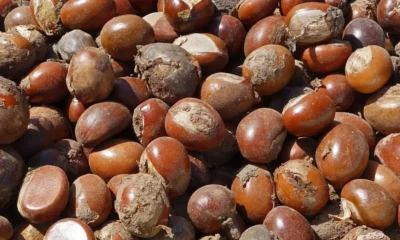Lifestyle
Historical Beliefs: How To Prepare Amala, Ewedu And Gbegiri
Amala is a popular traditional Nigerian food, particularly among the Yoruba people of southwestern Nigeria.

Amala is a popular traditional Nigerian food, particularly among the Yoruba people of southwestern Nigeria.
Amala is a popular traditional Nigerian food, particularly among the Yoruba people of southwestern Nigeria.
It is a type of swallow, which refers to a starchy, dough-like food that is rolled into balls and dipped into soups or sauces. Amala is typically made from yam flour or cassava flour (known as elubo or lafun), though the yam flour version is more common. Here’s a brief overview of the historical belief about Amala and how to prepare it:
Historical Beliefs: Amala holds a significant cultural and historical importance among the Yoruba people. It is often associated with gatherings, celebrations, and communal meals. Historically, it was believed to have been a food consumed by warriors and hunters due to its filling and energizing properties. It was considered a hearty meal that provided sustenance and strength for physical activities.
How to prepare prepare Amala:

Ingredients:
To prepare Amala, you’ll need the following ingredients:
- Yam flour (or cassava flour)
- Water
- Pot
- Wooden spatula or turning stick
Preparation:
- Boil water in a pot.
- Once the water reaches a rolling boil, reduce the heat to medium-low.
- Gradually add the yam flour to the pot, while stirring continuously with a wooden spatula or turning stick to prevent lumps from forming.
- Keep stirring until the mixture thickens and forms a smooth, stretchy dough-like consistency.
- Continue to cook and stir for a few more minutes until the Amala is fully cooked and reaches the desired texture.
- Remove the pot from the heat and allow the Amala to cool slightly before serving.
Amala is typically served with various soups or stews, such as Ewedu soup, Gbegiri soup, or Okra soup, as well as assorted meat or fish. It is often enjoyed as part of a larger meal shared with family and friends during festive occasions or everyday gatherings.
While the basic preparation method remains the same, variations in texture and flavor may occur based on personal preferences and regional differences in cooking techniques.
Ewedu Soup

Ewedu and Gbegiri are two traditional Nigerian soups that are popularly consumed, especially among the Yoruba people of southwestern Nigeria. Both soups are often served alongside Amala, a traditional Nigerian swallow made from yam or cassava flour, forming a classic and beloved combination in Yoruba cuisine.
Ewedu soup, also known as Jute leaf soup, is a green, slimy soup made from the leaves of the jute plant (Corchorus olitorius). It is known for its distinctive mucilaginous texture and mild flavor. Ewedu soup is rich in vitamins and minerals and is often considered a nutritious addition to the diet.
How to prepare Ewedu Soup
Ingredients:
- Ewedu leaves (jute leaves)
- Water
- Locust beans (Iru)
- Salt
- Seasoning cubes (optional)
Preparation:
- Wash the ewedu leaves thoroughly and remove any tough stems.
- Place the leaves in a pot with water and bring to a boil.
- Boil the leaves until they are soft and tender.
- Once cooked, use a blender or a special utensil called a ‘sokoro’ to blend the leaves into a smooth, slimy consistency.
- Return the blended ewedu to the pot and add locust beans (Iru), salt, and seasoning cubes to taste.
- Simmer the soup for a few more minutes, stirring occasionally, until it reaches the desired thickness.
Ewedu soup is typically served hot and is enjoyed with Amala or other traditional Nigerian swallows. It can be accompanied by assorted meats or fish and is often garnished with palm oil or other condiments for added flavor.
Gbegiri Soup:

Gbegiri is a savory Nigerian soup made from peeled brown beans. It has a smooth, velvety texture and a rich, earthy flavor. Gbegiri is often enjoyed as a side dish or combined with other soups to create a flavorful meal.
Ingredients:
- Brown beans (black-eyed peas)
- Water
- Onion
- Palm oil
- Ground crayfish
- Pepper
- Seasoning cubes
Preparation:
- Rinse the beans thoroughly and place them in a pot with water.
- Add chopped onions and bring to a boil.
- Cook the beans until they are soft and tender.
- Once cooked, blend the beans into a smooth paste using a blender or a food processor.
- Transfer the bean paste back into the pot and add palm oil, ground crayfish, pepper, and seasoning cubes to taste.
- Simmer the soup over low heat, stirring occasionally, until it thickens and reaches the desired consistency.
Gbegiri soup is traditionally served alongside Ewedu soup and Amala. It can also be enjoyed with other Nigerian swallows or rice dishes. Like Ewedu soup, Gbegiri is often garnished with palm oil or other condiments for added flavor.
You can check out more Lifestyle stories in our website. Enjoy!
























You must be logged in to post a comment Login